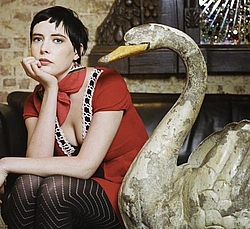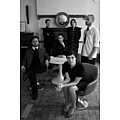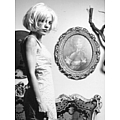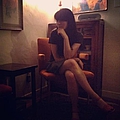Klima Biography
Klima (Angèle David-Guillou), female vocalist of Piano Magic, is a one-off; a London-based French singer-songwriter whose muse effectively synthesises a subtle array of influences from the wider shores of both Gallic and Anglo-American pop, rock and electronica to create highly personal music of unique allure. Angèle delivers her richly melodic essays in a voice that’s both conversationally intimate and smoulderingly sensual; yet, her songs, brimming as they are with wry lyrical apercus and insightful, autobiographical observations, range way beyond the parameters of the stereotypical, kohl-eyed French chanteuse. Indeed, Klima’s pointillist marriage of guitars, electronics, strings and intriguing atmospheres stake out a shimmering musical realm where time stops – an oasis of finely poised introspection, carefully immured against the distracting torrent of modern urban life. A classically trained musical all-rounder, Angèle’s first genuine influences were Neil Young and Simon & Garfunkel, though her pre-adolescent tastes also ran to the electric blues of Muddy Waters (“I love the way the different layers of guitar are almost the same but not exactly, sometimes it's almost dissonant,”) and, when she was fifteen, Sonic Youth and the Buzzcocks. From there her horizons opened further. “I discovered electronic music with the likes of Aphex Twin and Isan and realised I loved repetitiveness in music - which is why I also love Steve Reich - as well as slowness…” This rich matrix of influences coheres implicitly in the glittering Klima sound. “I realised I wanted to try and reach an electronic, or even classical way of writing music, Angèle affirms, “with repetitiveness and patterns evolving slowly, but with more guitars than electronic instruments.” Klima’s self-titled debut album, due for release on Peacefrog in February ’07, bears triumphal testament to the efficacy of Angèle’s modus operandi. Lyrically, her songs remain singular, free from obvious influence, apparently untethered to any specific precedent. Playful yet elusive, filled with intimate, quotidian references, the lines often honed to a haiku-like essence, her words are agreeably approachable yet tantalisingly elusive. Seductive pre-album single (and opening track on the LP) ‘The City’ finds Angèle in existentially reflective mood, finding new angles on the ‘lonely-in-a-crowd’ isolation of urban life. “'The City' was written in Paris in a 20m squared flat, not far from the Luxembourg Garden”s, she reveals. “It was on the first floor of a building on a busy street, and I was woken up by cars every morning. When I was sitting on my sofa and looking at the cars driving by, I quite often felt like I was actually the one moving, as if on a boat or a train. It was quite magical in fact. ‘The City’ is about being on my own in that flat and wanting someone to be there with me.” Despite the subject matter, a good deal of the album was actually penned far away from the metropolitan hubbub and, indeed, Angèle admits to drawing inspiration from different kinds of seclusion. “I love big cities and really isolated countryside equally. Both are quite similar to me, in a strange way. It’s not really for me to say, but perhaps you can detect both urban and ‘earthy’ qualities in the songs on the album…” Angèle’s ability to thread palpable emotional honesty into songs that are superficially airy and often beguilingly pretty, is another of her trump cards. There’s an ingenuous yearning quality at play in a dreamy, sepia-tinted essay like ‘I Love That Day’, which owes nothing to Grand Guignol melodrama. It’s also a neat inversion of the Groundhog Day principle. “'I Love That Day' is about the last day I spent in London after living there for six months several years ago. It's about doing simple things that mean a lot. It's about trying to remember those little things, as if kept on a photograph. It's about losing something but wanting to retain as much as possible.” Angèle’s songs are nothing if not personal, full of poignant images and overarching ambiences that oscillate, at the drop of a minor chord, between rapture and melancholy – exquisitely so on the haunting ‘Lady Of The Lake’. ”It’s about my best friend as a child who committed suicide when he was 15, Angèle reveals. “We had been neighbours since we were born. He always wanted to wear his mother's clothes and make up (he turned out to be gay). We used to ‘get married’ several time during the summer, which the song talks about. The repeated lines at the end are actually me trying to convince myself, or him, that it's never really the end of the world. The fact is when you die, it is the end! I wanted the song to sound like a super 8 film, like partially erased memories. I like to keep a sense of vagueness, of blurredness, or soft focus, that you get with memories…” Angèle cites ‘symptomological’ West Coast hippy novelist Richard Brautigan as a key influence, revering his ability to “use simple vocabulary and very simple syntax to describe something very complex.” For Angèle, there is more to words than their mere dictionary definition. “The sonority of the words is important too,” she contends, batting away the idea of lyrics as manifesto. “I certainly don’t have any universal or philosophical aims. First of all I write for myself. It’s a great satisfaction to be able to say something personal with few words but in the most accurate way possible.” She writes entirely in English because, “It’s my music language. French is the language I use best to express myself in every day life - to swear and argue in particular - but when it comes to writing and singing, English is the language I feel the most comfortable in. I love the way it sounds, I love its diphthongs which we don't have in French. Named after the German word for ‘climate’ (itself derived from the Greek, meaning ‘inclination’) Angèle’s nom-du-disc celebrates her full autonomy as a solo artist after miscellaneous collaborative adventures and more than one brush with fame. The roots of Klima go back some way, however. Cutting her teeth as lead singer in a power pop band in her home town, Tours (in the Loire Valley), by the late ‘90s, having been bitten by electronica, the teenage Angèle was drawn to creating “some quieter music”. She took time out to compose a new set of songs, playing all the instruments – a subtle combination of electronics and acoustics - herself. Thus was born the prototype Klima. In 1999, Angèle moved to London to study where she fell into the orbit of Glen Johnson, principal songwriter of esteemed retro-futurist collective Piano Magic – habitual employers of guest lead singers. Inevitably, Angèle’s vocals were soon gracing Piano Magic records, and she would go on to contribute to every subsequent PM album and EP, to Johnson’s electronic side project Textile Ranch and to the PM live band. On return from her London sojourn, Angèle joined French group Ginger Ale - then signed to Virgin France. The band’s cover of Siouxsie & The Banshees’ Happy House, sung by Angèle, was a club hit in Paris and London (with popular remixes by Dexter and Antoine de Crécy). Extensive touring followed, as did TV show appearances (including ARTE’s Music Planet Tonight, a live concert in tandem with Marianne Faithful, and various talk shows with the likes of Jane Birkin). With Angèle’s vocals and lyrics much to the fore, the band’s - Daggers Drawn album was released, to critical acclaim, in February 2006. While this frenetic activity whirled, Klima was quietly maturing. Angèle started releasing tracks under the name, initially for two compilation albums and a split single with Piano Magic before recording tracks for the debut Klima album. When these came to the attention of London label Peacefrog (José González, Nouvelle Vague) they wasted no time in signing her up. Composed and programmed by Angèle at home on her 8-track machine and recorded with Piano Magic’s Jerome Tcherneyan at the controls, Klima’s full debut was mixed by Guy Fixsen of Laïka, who also produced the live strings played by Gwen Cheeseman (of Domino singings Psapp), while Christophe Rosin (guitar) and Laika/Eardrum’s Lou Ciccotelli (drums and percussion) leant melodic lustre and rhythmic pulse, respectively. Meanwhile, Angèle’s busy schedule goes on unabated. She recently sang on an album by venerable Gallic rock star, Hubert-Felix Thiéfaine (for Sony BMG) and collaborated with the visual artist Loris Gréaud - currently a cause celebre in the contemporary art world. He used the instrumental version of the Klima track ‘Your Game Is Over’ as the aural signature in his work The Eye Of The Duck (based on a quotation by filmmaker David Lynch). The piece has won much praise and has been exhibited in Paris and Tokyo. Currently putting a live Klima band together capable of doing justice to her expertly realised, multi-textured album, Angèle is preparing for what promises to be a very high visibility 2007. In the meantime she’ll continue to eschew wider aspirations in favour of undiluted creative integrity. “The only hope I have is to manage to create something personal, musically speaking”, she concludes. “I don’t really expect anything more. I’ve always been making music and I know I always will, whatever happens...” (David Sheppard)
Klima Lyrics
Write a comment
What do you think about Klima? Let us know in the comments below!
Klima Albums
| Title | Release | ||
|---|---|---|---|
| 1 | Klima | 2007 |
Similar artists
- Piano MagicElectronic/Indie
- Sol SeppyIndie
- DaphneRock
- DevicsIndie
- Masha QrellaElectronic/Indie
- Shannon WrightFolk/Indie

















